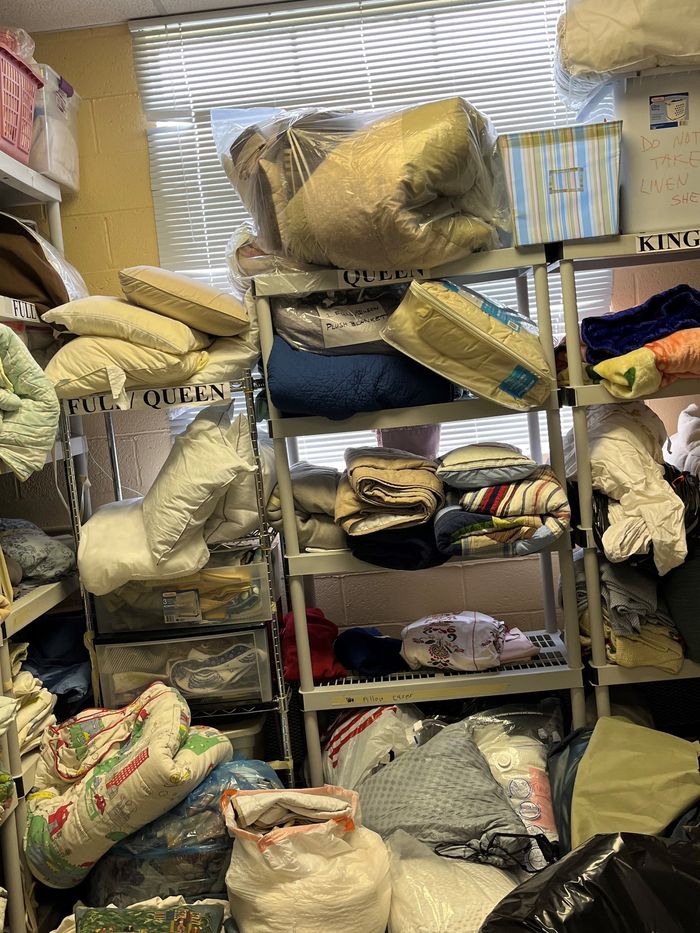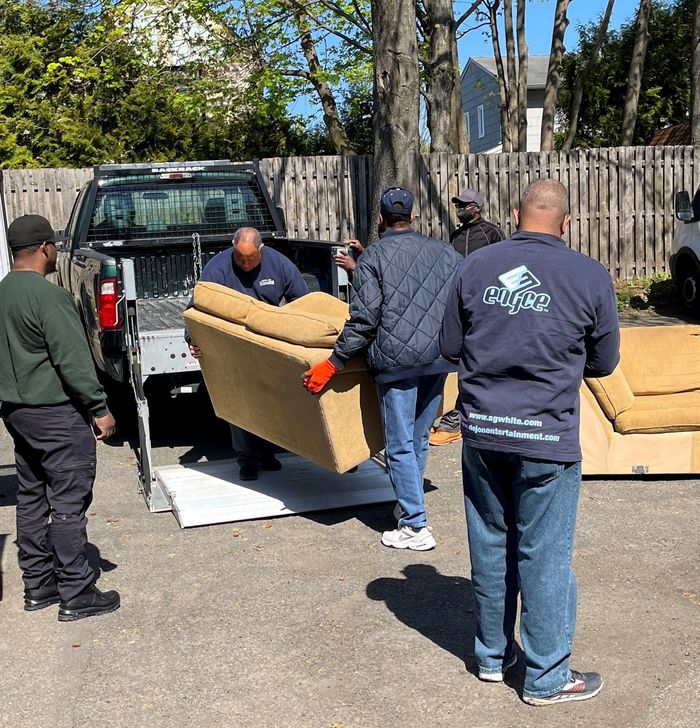Forgive me if I’m a little sweaty writing this installment of The View From Unretirement.
I’ve just come back from 2 ½ hours in 90° heat, lugging furniture, boxes and bags while volunteering for a wonderful Springfield, N.J., nonprofit called Furniture Assist.
This organization, founded by cheerful retiree Dawson Yeomans, accepts unwanted home possessions driven in by donors on Sundays and lets people who need or want them — sent by social service agencies — take and cart them away on Saturdays.
“We are, in effect, the storage space for the donors who want to give us stuff, and we can parcel it out to the [social services] agencies,” Yeomans explained. “We normally furnish between 15 and 20 apartments every week and normally, on Sundays, 60 to 80 donors come with donations.”
Read: These are the Best New Ideas in Retirement
Furniture Assist fills up its warehouse space to the brim by Sunday’s end with nearly everything people want to give away, from dining room tables and sofas to baby clothes and toys to kitchen appliances to computers and office chairs to assorted tchotchkes (my wife gave away two flamingo planters and five porcelain heads).
For the past month, I’ve been volunteering at Furniture Assist most Saturdays and Sundays. My fellow volunteers — and this is my favorite part — are an intergenerational cadre of mostly other retired men like me and teenagers (sometimes with their parents).

Furniture Assist donations.
Richard Eisenberg
At Furniture Assist, Yeomans, said, “we have volunteers from high schools and younger, we have adults who are trying to show their kids that not every kid has as nice a life as they do, and we have older people who just want to give back.”
Volunteering at Furniture Assist comes full circle from a popular 2017 article I wrote for the website Next Avenue, “Sorry, Nobody Wants Your Parents’ Stuff.” It grew out of the recent death of my father when my sister Robin and I had terrible trouble finding organizations that would take many of the items he and my late mother had owned.

Furniture Assist volunteers.
Richard Eisenberg
I also volunteered recently in my New Jersey hometown as an usher and greeter at Big Dreams’ Westfield International Film Festival featuring movies by students in grades 1 through 12. There, I had the pleasure of helping founder and festival director Gina Marie Rodriguez and seeing the young directors, actors, along with their families and friends, beaming about their imaginative, thoughtful, entertaining films.
If you ask me, there’s no better way to find meaning and purpose in retirement than by volunteering. And if you can do it alongside young people, even better.
“Often, these two [groups] are so siloed,” says Eunice Lin Nichols, vice president of innovation at Encore.org, a nonprofit whose stated mission is to bring older and younger changemakers together to solve problems, bridge divides and cocreate the future.
“I think volunteerism could be the secret sauce to getting us into conversation with each other as we work side by side, getting some good work done,” Nichols said.
Atalaya Sergi, national director of the government’s AmeriCorps Seniors service program, told me last year when I interviewed her as a Next Avenue Influencer in Aging: “When older adults engage in service, they bring so much lived experience and prior knowledge to that service, in addition to a desire to leave their community better.”
Research has also shown that volunteering can improve their mental and physical health. AmeriCorps Seniors found that 84% of its volunteers reported stable or improving health after one year of service.
And a 2020 study in the American Journal of Preventive Medicine discovered that people over 50 who volunteered more than 100 hours a year (roughly two hours a week), had a reduced risk of mortality and physical functioning limitations, more optimism and purpose in life and less depression, hopelessness and loneliness than those who didn’t.
“We know that when volunteers are volunteering regularly, they’re moving physically more,” said Nichols. “They’re connecting with people and exercising their brain as they engage in learning new things.”
I can attest.
I asked a few teens at Furniture Assist — who get required community-service high school credits for their hours there — about the benefits they saw volunteering along with retirees.
“I think it’s good that multiple generations are volunteering together. because there’s some stuff that some people can’t do and other people can do,” said David Hurtares, a junior at Jonathan Dayton High School in Springfield. “And it just makes the workload a lot easier and better.”
He’s right about that.
I admire the young volunteers’ ability to lift heavy furniture and take sledgehammers to break up damaged pieces for disposal. We older ones help direct traffic of the donors and recipients, prepare receipts, lug boxes and bags and, OK, kibitz with each other. In between deliveries and pickups, the generations talk with each other (sometimes, of course, we’re on our phones).
Alan Ostrovsky, a junior at Union County Academy for Information Technology in Scotch Plains, N.J., said he enjoys chatting with the retirees: “A lot of times, it’s actually quite interesting to hear the stories the older generation tell about how their life has gone on.”
Ostrovsky also likes “watching all the families come in and the smiles on their faces when they take away the furniture they need.”
Last Saturday, Krish Kapoor and his mother Nidhi Khanna, of Livingston, N.J., were on their second stint volunteering at Furniture Assist. They do it through the Young Men’s Service League national program for students and their parents.
“We were looking for volunteer opportunities, and last time when we came here, we got to meet very, very wonderful people,” said Khanna. And we felt this is something which we can really add value to. So why not come back again and see how we can help?”
Her son’s take: “What I like about it is you see people who really need things and they may be having a difficult time or they may just not be able to afford them. And then when they leave here, you’re really going to help them live the way they want to live. The feeling in the heart is very, very peaceful.”
Those words perfectly explain why Yeomans, a former computer systems designer, decided to start Furniture Assist in 2004, an outreach from his church, St. Luke All Saints, in Union, N.J.
“Places like Goodwill and Salvation Army sell the items they get and therefore they need a little higher quality than we do. They need the items their customers would buy. We don’t have that restriction. We give the stuff away free,” said Yeomans, who always shows up for the weekend work wearing smart, button-down shirts and slacks.
His nonprofit only declines items such as outdated televisions that aren’t flat screens, infant car seats, lighting fixtures requiring electricians, humongous breakfronts and stained furniture.
With a nod to my “Parents’ Stuff” article, Yeomans said he often hears donors telling him their late parents “would have been so happy to know that somebody’s going to get their items.”
Another comment Yeomans said he hears: “As soon as I get home, I’m going to throw all my stuff out because I’m not going to put my kids through what I just went through, cleaning up mom and dad’s house.”
If you’d like to volunteer in retirement but don’t know where, Nichols has four recommendations.
The first is VolunteerMatch, which even lets you filter opportunities for people 55-plus. “If you check the ‘good for fifty-five plus,’ that’s an organization that has said ‘We would love to have some older volunteers,’” Nichols noted.
The second is AARP’s Create the Good. The site says it will show you how to “connect with ways to share your life experience and skills that match your schedule and interests.” Create the Good also lets you select only home/remote opportunities, if you’d prefer to volunteer that way.
The third is AmeriCorps Seniors, which has three volunteering programs, sometimes with small stipends: Foster Grandparent (connecting older and younger people), RSVP (helping meet critical community needs) and Senior Companion (assisting older adults who have trouble with daily living tasks). Its online Pathfinder tool can help you locate a nearby AmeriCorps Seniors volunteering opportunity.
The last is environmentalist Bill McKibben’s new movement for people 60+, Third Act. “He’s doing some of the most interesting work around why older and younger people need to come together to work on voting rights, racial justice and climate action,” said Nichols.
She cautions against trying too hard to find the perfect place to volunteer.
“You do want to use your skill-sets, but I sure hope you also want to do good. Sometimes good nonprofits, especially coming out of the pandemic, are underwater. So how do you just show up and do what needs to be done?” she asked.
The U List
From time to time, I like to share with readers of The View From Unretirement a few pop-culture takes I think you’ll like. There are two new podcast episodes and one streaming series I especially enjoyed.
The podcast episodes are about older workers and, I think, of interest to people working in retirement. The streaming series features someone you know who’s doing terrific work in retirement: David Letterman.
Podcast episode 1 is part of the Stanford Center on Longevity’s “Century Lives” series hosted by Ken Stern. The episode, called “The 25-Job Career,” is about how the traditional career ladder that many boomers climbed is being replaced with more of a squiggly one. I think this trend may have problematic implications for retirement because frequent job hopping can make it harder to qualify for, and save much in, 401(k) retirement plans.
Podcast episode 2 is in The Wall Street Journal’s “As We Work” series hosted by Tess Vigeland. It’s called “Age of Reinvention: How Seasoned Workers Can Add Spice to a Team.” Here, career coach Ginny Cheng and Vigeland present as good a case against ageism by employers as I’ve heard.
And just for fun, there’s the just-released season of Netflix’s “My Next Guest Needs No Introduction with David Letterman.” As you undoubtedly know, Letterman, now 75, retired in 2015 after 33 years hosting late-night talk shows on CBS and NBC. These days, he holds one-on-one filmed conversations with celebrities. On the new season, they include six talks with the likes of Billie Eilish, Julie Louis-Dreyfus and (pre-Oscars slap) Will Smith. Treat yourself.










Add Comment